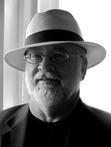Bruce DeSilva's Blog, page 38
December 11, 2012
The Next Big Thing
Gar Anthony Haywood reading my latest novel, “Cliff Walk.”
Gar Anthony Haywood, one of my favorite crime novelists, invited me to participate in “The Next Big Thing,” an online promotion designed to introduce readers to writers’ favorite authors. Here’s how it works.
I answer ten questions about myself and my latest work and then point you to websites where you can see how a couple of my favorite writers answer the same questions on December 19. I’m playing along because I’m eager to introduce as many readers as possible to the work of Timothy Hallinan and Patricia Smith–and because I’m ready to do anything that might help me sell a few books.
1) What is the working title of your next book?
Cliff Walk, the second novel in my series featuring Liam Mulligan, an investigative reporter at a dying Providence, Rhode Island, newspaper, was published in June. The third, tentatively titled Providence Rag, will appear sometime late next year.
2) Where did the idea come from?
Cliff Walk grew out of my curiosity about why prostitution was legal in Rhode Island for two decades. It became legal more than 20 years ago when a lawyer discovered that the state’s criminal code referred to the crime only as “street walking.” Therefore, he argued, sex for money was permitted in Rhode Island as long as the transaction occurred indoors. After judges agreed, the state’s politicians made lots of speeches about the shame of it — but they didn’t get around to fixing the glitch until a couple of years ago.
Providence Rag was inspired by a real Rhode Island murder investigation in which the bad guy, the youngest serial killer in history, started slaughtering his neighbors when he was 13 years old.
3) What genre do your books fall under?
I think of the Mulligan novels as hardboiled detective stories, but the publisher markets them as thrillers. I’d like to think, however, that they are more sophisticated than that. The books I like best use the popular form of the crime novel to examine social issues in an entertaining way. Cliff Walk, for example, is both an entertaining mystery about political corruption and murder and a serious examination of sex and religion in the age of pornography.
4) What actor would you choose to play the part of your main character in a movie?
I picture my protagonist as looking and sounding like Dennis Leary, the Boston actor who starred in the TV show “Rescue Me”; but I think there would be more money in it if he were played by Matt Damon.
5) Give us a one-sentence synopsis of your book.
Cliff Walk: An investigative reporter trying to learn who’s getting paid off to keep prostitution legal in Rhode Island is offered free sex to lay off and threatened with a savage beating or worse if he doesn’t.
Providence Rag: Faced with releasing a convicted serial killer on a legal technicality, a community is confronted with a moral dilemma: What’s worse, faking new charges to keep the killer locked up or letting him out so he can kill again?
6) Will your book be self-published or represented by an agency?
I’m represented by Susanna Einstein of the Einstein Thompson Agency. Susanna is not only a great agent but one of the best story editors I’ve ever known.
7) How long did it take you to write the first draft?
When I’m working on a novel, I turn out a minimum of 1,000 words a day. If I get those words written in two hours, I give myself the rest of the day off; but I make myself write 1,000 words no matter how long it takes. At that pace, I can finish the first draft of an 80,000-word crime novel in 80 days. However, never write a first draft straight through. I revise as I go, completing a novel in about six months.
8) What other books would you compare this story to within your genre?
Reviewers have compared my work to Elmore Leonard, Raymond Chandler, Lawrence Block, George Pelecanos, and Robert B. Parker — which I find odd because I don’t think those writers’ styles are all that much alike. I think the most apt comparison is Dennis Lehane’s Kinsey and Gennaro detective novels.
9) Who or what inspired you to write this book?
The organized crime bosses, cops, prostitutes, priests, arsonists, lawyers, con artists, FBI agents, and corrupt politicians I got to know during my 40-year journalism career are an endless source of inspiration. But the Mulligan series as a whole was inspired by my desire to write about the demise of the newspaper business. I can’t begin to tell you what a bad thing this is for the American democracy. I hope that as readers follow the skill and dedication with which my main character, Liam Mulligan, works, they will gain a greater appreciation for what is being lost as newspapers fade into history.
10) What else about the books might pique the reader’s interest?
My fiction has won both the Edgar and Macavity Awards and been a finalist for the Anthony, Barry, and Shamus Awards. Professional book reviewers have universally praised them. For example, The Dallas Morning News, declared that my first novel, Rogue Island, “raises the bar for all books of its kind,” and Publishers Weekly called my protagonist “a masterpiece of of irreverence and street savvy.” One of the things reviewers like most about the books is the voice I tell the stories in. I find that gratifying because I work hard at it. People think they read with their eyes, but they really read with their ears. They hear the voice of the writer speaking to them from the page, and what that voice sounds like is vital to the success of any piece of writing.
You can purchase the first two Mulligan crime novels here.
Curious about what a couple of my favorite writers are doing for their Next Big Thing? Drop in at these websites next Wednesday, December 19, to find out.


December 8, 2012
“Cliff Walk” Makes an NPR Affiliate’s List of the Best Books of 2012!
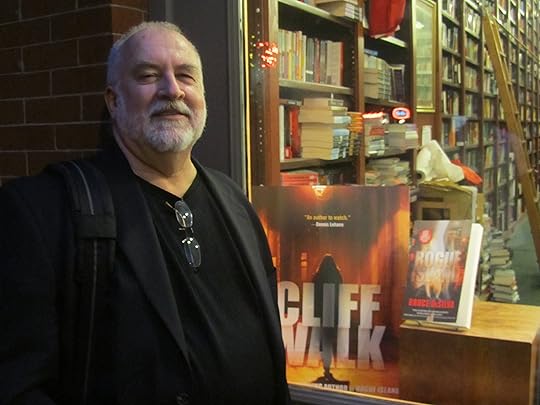
Me at the Mysterious Bookshop
My thanks to Scott MacKay of Rhode Island’s NPR affiliate for including my latest Mulligan crime novel, Cliff Walk, on his list of the best books of 2012. Check out his list here.
Cliff Walk, the sequel to my Edgar Award-winning first Mulligan novel, Rogue Island, got great reviews. You can purchase the Mulligan novels here.


December 6, 2012
At the Mysterious Bookshop
 That’s me and my wife, Patricia Smith, promoting “Staten Island Noir,” a new anthology from Akashic Press, at the Mysterious Bookshop in Manhattan. Patricia edited the book and I wrote one of the stories. Reviewers are calling it one of the best of Akashic’s noir series. Ted Anthony, another of the authors, took the picture.
That’s me and my wife, Patricia Smith, promoting “Staten Island Noir,” a new anthology from Akashic Press, at the Mysterious Bookshop in Manhattan. Patricia edited the book and I wrote one of the stories. Reviewers are calling it one of the best of Akashic’s noir series. Ted Anthony, another of the authors, took the picture.


December 3, 2012
Revised Top 10 List: Best Crime Novels of 2012
When I first posted my list of the ten best crime novels of 2012, I forgot to include one of my favorites, Joseph Olshan’s brilliant literary tale, Cloudland. I don’t have the heart to delete any of the others to make room for it, so my revised list is now the top eleven.
My list includes two debut novels, work by several writers who have never made the best-seller lists, and the latest offerings from a few of the most popular writers in the business.
A couple of caveats: 1. These are the books I most enjoyed this year. Of course I haven’t read everything, so I’m sure I missed some great work. Don’t hesitate to list your favorites in the comment section below. 2. I prefer hardboiled, noir, and literary crime fiction, so such books dominate my list. I’m not a big fan of espionage novels, I loathe cozies, and I refuse to read books in which crimes are solved by little old ladies, hairdressers, or cats.
 Cloudland by Joseph Olshan. Catherine Winslow, a former investigative reporter for a big-city newspaper, has withdrawn to a remote cabin in rural Vermont to write a household hints column. But one spring day, she discovers a frozen corpse in a thawing snowbank near her home. It turns out to be the latest victim of a serial killer who’s been terrorizing the state. Catherine’s investigation makes for gripping reading, but the true appeal of this novel is the elegant, haunting prose of a masterful stylist.
Cloudland by Joseph Olshan. Catherine Winslow, a former investigative reporter for a big-city newspaper, has withdrawn to a remote cabin in rural Vermont to write a household hints column. But one spring day, she discovers a frozen corpse in a thawing snowbank near her home. It turns out to be the latest victim of a serial killer who’s been terrorizing the state. Catherine’s investigation makes for gripping reading, but the true appeal of this novel is the elegant, haunting prose of a masterful stylist.
 Dead Anyway by Chris Knopf. A hit man invades Arthur Cathcart’s posh Connecticut home, kills his wife, and nearly does the same to Arthur. After he recovers, Arthur lets everyone think he is dead, too, and sets out to discover who was behind the attack and why. The novel is brilliantly plotted with lots of twists and turns, and the writing so tight that I wouldn’t cut a word.
Dead Anyway by Chris Knopf. A hit man invades Arthur Cathcart’s posh Connecticut home, kills his wife, and nearly does the same to Arthur. After he recovers, Arthur lets everyone think he is dead, too, and sets out to discover who was behind the attack and why. The novel is brilliantly plotted with lots of twists and turns, and the writing so tight that I wouldn’t cut a word.
 Creole Belle by James Lee Burke. New Iberia, LA, police detective Dave Robicheaux and his violent sidekick, Clete Purcell, are back at it, battling the forces that corrupt and despoil their beloved Southern Louisiana. As the story unfolds, the two friends discover that the troubles of a missing lounge singer are somehow connected to a conspiracy involving an art-theft ring, sex slavery, and corrupt oil company executives. In their 19 books together, Clete has always been the second banana, but this time he plays such large role that this is more his book than Dave’s.
Creole Belle by James Lee Burke. New Iberia, LA, police detective Dave Robicheaux and his violent sidekick, Clete Purcell, are back at it, battling the forces that corrupt and despoil their beloved Southern Louisiana. As the story unfolds, the two friends discover that the troubles of a missing lounge singer are somehow connected to a conspiracy involving an art-theft ring, sex slavery, and corrupt oil company executives. In their 19 books together, Clete has always been the second banana, but this time he plays such large role that this is more his book than Dave’s.
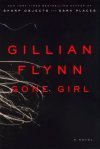 Gone Girl by Gillian Flynn. On their fifth wedding anniversary, Nick and Amy Dunne’s marriage is in trouble. So when Amy disappears and their house in North Carthage, Missouri, shows signs of a struggle, Nick finds himself suspected of murder in this diabolically clever psychological thriller. The tightly-written story is told with alternating narrators, both major characters taking a turn.
Gone Girl by Gillian Flynn. On their fifth wedding anniversary, Nick and Amy Dunne’s marriage is in trouble. So when Amy disappears and their house in North Carthage, Missouri, shows signs of a struggle, Nick finds himself suspected of murder in this diabolically clever psychological thriller. The tightly-written story is told with alternating narrators, both major characters taking a turn.
 Bad Little Falls by Paul Doiron. Mike Bowditch’s duties as a Maine game warden do not include investigating murders, so when a frozen body is found near a remote cottage, his boss warns him to butt out. But when the police seem intent on pinning the murder on Mike’s new girlfriend’s brother, he jumps into the case. The plot is riveting; but as always in a Doiron novel, the greatest attraction is the stark beauty of the language and the vivid portrayal of his native Maine.
Bad Little Falls by Paul Doiron. Mike Bowditch’s duties as a Maine game warden do not include investigating murders, so when a frozen body is found near a remote cottage, his boss warns him to butt out. But when the police seem intent on pinning the murder on Mike’s new girlfriend’s brother, he jumps into the case. The plot is riveting; but as always in a Doiron novel, the greatest attraction is the stark beauty of the language and the vivid portrayal of his native Maine.
 Flat Spin by David Freed. Cordell Logan, a former assassin for a top-secret military squad, is scraping out a living by giving flying lessons to spoiled rich kids. He’s haunted by his past, longing for his beautiful ex-wife Savanna, and failing miserably–and hilariously–to find peace through his recent conversion to Buddhism. When Savannah’s new husband is gunned down, Logan is briefly elated, but the mood evaporates when he finds himself a suspect. So he sets out to solve the crime himself. This debut novel is written in superb prose that is at once muscular and musical — and sometimes verges on poetry.
Flat Spin by David Freed. Cordell Logan, a former assassin for a top-secret military squad, is scraping out a living by giving flying lessons to spoiled rich kids. He’s haunted by his past, longing for his beautiful ex-wife Savanna, and failing miserably–and hilariously–to find peace through his recent conversion to Buddhism. When Savannah’s new husband is gunned down, Logan is briefly elated, but the mood evaporates when he finds himself a suspect. So he sets out to solve the crime himself. This debut novel is written in superb prose that is at once muscular and musical — and sometimes verges on poetry.
 Live By Night by Dennis Lehane. Joe Coughlin, the lawless son of a Boston police commander, robs a speakeasy owned by the city’s top mobster, does a turn in state prison, and then flees to Florida where he winds up taking over the bootlegging racket in Prohibition-era Tampa. The novel is the sequel to the author’s fine historical crime novel, The Given Day, which introduced us to the Coughlin clan. The new novel lacks the historic and generational sweep of the earlier book, but it succeeds on its own terms, portraying a lawless era in swashbuckling prose.
Live By Night by Dennis Lehane. Joe Coughlin, the lawless son of a Boston police commander, robs a speakeasy owned by the city’s top mobster, does a turn in state prison, and then flees to Florida where he winds up taking over the bootlegging racket in Prohibition-era Tampa. The novel is the sequel to the author’s fine historical crime novel, The Given Day, which introduced us to the Coughlin clan. The new novel lacks the historic and generational sweep of the earlier book, but it succeeds on its own terms, portraying a lawless era in swashbuckling prose.
 The Lost Ones by Ace Atkins. Former U.S. Army Ranger Quinn Colson has just been elected sheriff of rural Tibbehah County, Mississippi; and given the area’s legacy of lawlessness and corruption, he’s got his work cut out for him. Soon he’s on the trail of a gang that’s selling Mexican babies and hoping that his old army buddy Donnie Varner is not behind a plot to supply military firearms to drug dealers. As with every Atkins novel, the setting is superbly drawn, the characters are so real that you could reach out and shake their hands, and the writing is as precise as a sniper rifle.
The Lost Ones by Ace Atkins. Former U.S. Army Ranger Quinn Colson has just been elected sheriff of rural Tibbehah County, Mississippi; and given the area’s legacy of lawlessness and corruption, he’s got his work cut out for him. Soon he’s on the trail of a gang that’s selling Mexican babies and hoping that his old army buddy Donnie Varner is not behind a plot to supply military firearms to drug dealers. As with every Atkins novel, the setting is superbly drawn, the characters are so real that you could reach out and shake their hands, and the writing is as precise as a sniper rifle.
 The Skeleton Box by Bryan Gruley. Gus Carpenter is the newspaper editor in Starvation Lake, Michigan, an authentic realm of piney woods, working-class bars, lakefront cottages, rampant gossip, and small-town cops where everyone is obsessed with a junior hockey team called The River Rats. The townspeople are in a panic about a series of house breaks dubbed the “Bingo Night Robberies” because on each game night, someone ransacks the empty home of an elderly resident. The weird part? The burglar never takes anything. Things take a turn for the worse when an elderly resident skips bingo and ends up dead–and one of Gus’s friends becomes the prime suspect. The plot is emotionally wrenching and filled with more twists and turns than the little town’s winding, snow-choked roads.
The Skeleton Box by Bryan Gruley. Gus Carpenter is the newspaper editor in Starvation Lake, Michigan, an authentic realm of piney woods, working-class bars, lakefront cottages, rampant gossip, and small-town cops where everyone is obsessed with a junior hockey team called The River Rats. The townspeople are in a panic about a series of house breaks dubbed the “Bingo Night Robberies” because on each game night, someone ransacks the empty home of an elderly resident. The weird part? The burglar never takes anything. Things take a turn for the worse when an elderly resident skips bingo and ends up dead–and one of Gus’s friends becomes the prime suspect. The plot is emotionally wrenching and filled with more twists and turns than the little town’s winding, snow-choked roads.
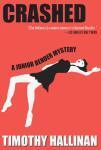 Crashed by Timothy Hallinan. The first novel in a series featuring professional burglar Junior Bender is today’s Los Angeles as Raymond Chandler might have written it. Tim is a master at tossing out the kind of hard-boiled lines that I wish I thought of first. A sample: She wore the kind of distressed jeans they distress by rubbing money on them. It’s not exactly a 2012 novel because it was previously published as an e-book, but it was recently released in hardcover by Soho Crime.
Crashed by Timothy Hallinan. The first novel in a series featuring professional burglar Junior Bender is today’s Los Angeles as Raymond Chandler might have written it. Tim is a master at tossing out the kind of hard-boiled lines that I wish I thought of first. A sample: She wore the kind of distressed jeans they distress by rubbing money on them. It’s not exactly a 2012 novel because it was previously published as an e-book, but it was recently released in hardcover by Soho Crime.
 Hope’s Road by William Wells. It has been two years since Hope, Jack Tanner’s bright and beautiful only child, walked out of her apartment at the University of Wisconsin and vanished into the night. Police think she was murdered by her boyfriend, a rich kid now living the high life in Key West; but they can’t prove it. Jack has lived the most ordinary of lives and he’s not one for confrontation. Still, he feels compelled to track down the old boyfriend and get him to reveal what he did to Hope. Jack knows he’s not up to the task, so he buys a motorcycle and sets off on a 1,700 journey to Key West, hoping he will become man enough to do what needs to be done by the time he arrives. This debut novel is a remarkable tale of heartbreak, healing, and self-discovery superbly written in an elegant, lyrical style. The story is romantic yet unwaveringly clear-eyed about life–and death.
Hope’s Road by William Wells. It has been two years since Hope, Jack Tanner’s bright and beautiful only child, walked out of her apartment at the University of Wisconsin and vanished into the night. Police think she was murdered by her boyfriend, a rich kid now living the high life in Key West; but they can’t prove it. Jack has lived the most ordinary of lives and he’s not one for confrontation. Still, he feels compelled to track down the old boyfriend and get him to reveal what he did to Hope. Jack knows he’s not up to the task, so he buys a motorcycle and sets off on a 1,700 journey to Key West, hoping he will become man enough to do what needs to be done by the time he arrives. This debut novel is a remarkable tale of heartbreak, healing, and self-discovery superbly written in an elegant, lyrical style. The story is romantic yet unwaveringly clear-eyed about life–and death.
That makes eleven, but I would be remiss if I didn’t also give a tip of the hat to:
Taken by Robert Crais
All I Did Was Shoot My Man by Walter Mosley
The Black Box by Michael Connelly
Robert B. Parker’s Lullaby by Ace Atkins, who did a superb job of resurrecting the late Parker’s popular Boston P.I., Spenser.


Top 10 List: Best Crime Novels of 2012
This is my list of the ten best crime novels of 2012. It includes two debut novels, work by several writers who have never made the best-seller lists, and the latest offerings from a few of the most popular writers in the business.
A couple of caveats: 1. These are the books I most enjoyed this year. Of course I haven’t read everything, so I’m sure I missed some great work. Don’t hesitate to list your favorites in the comment section below. 2. I prefer hardboiled, noir, and literary crime fiction, so such books dominate my list. I’m not a big fan of espionage novels, I loathe cozies, and I refuse to read books in which crimes are solved by little old ladies, hairdressers, or cats.
 Dead Anyway by Chris Knopf. A hit man invades Arthur Cathcart’s posh Connecticut home, kills his wife, and nearly does the same to Arthur. After he recovers, Arthur lets everyone think he is dead, too, and sets out to discover who was behind the attack and why. The novel is brilliantly plotted with lots of twists and turns, and the writing so tight that I wouldn’t cut a word.
Dead Anyway by Chris Knopf. A hit man invades Arthur Cathcart’s posh Connecticut home, kills his wife, and nearly does the same to Arthur. After he recovers, Arthur lets everyone think he is dead, too, and sets out to discover who was behind the attack and why. The novel is brilliantly plotted with lots of twists and turns, and the writing so tight that I wouldn’t cut a word.
 Creole Belle by James Lee Burke. New Iberia, LA, police detective Dave Robicheaux and his violent sidekick, Clete Purcell, are back at it, battling the forces that corrupt and despoil their beloved Southern Louisiana. As the story unfolds, the two friends discover that the troubles of a missing lounge singer are somehow connected to a conspiracy involving an art-theft ring, sex slavery, and corrupt oil company executives. In their 19 books together, Clete has always been the second banana, but this time he plays such large role that this is more his book than Dave’s.
Creole Belle by James Lee Burke. New Iberia, LA, police detective Dave Robicheaux and his violent sidekick, Clete Purcell, are back at it, battling the forces that corrupt and despoil their beloved Southern Louisiana. As the story unfolds, the two friends discover that the troubles of a missing lounge singer are somehow connected to a conspiracy involving an art-theft ring, sex slavery, and corrupt oil company executives. In their 19 books together, Clete has always been the second banana, but this time he plays such large role that this is more his book than Dave’s.
 Gone Girl by Gillian Flynn. On their fifth wedding anniversary, Nick and Amy Dunne’s marriage is in trouble. So when Amy disappears and their house in North Carthage, Missouri, shows signs of a struggle, Nick finds himself suspected of murder in this diabolically clever psychological thriller. The tightly-written story is told with alternating narrators, both major characters taking a turn.
Gone Girl by Gillian Flynn. On their fifth wedding anniversary, Nick and Amy Dunne’s marriage is in trouble. So when Amy disappears and their house in North Carthage, Missouri, shows signs of a struggle, Nick finds himself suspected of murder in this diabolically clever psychological thriller. The tightly-written story is told with alternating narrators, both major characters taking a turn.
 Bad Little Falls by Paul Doiron. Mike Bowditch’s duties as a Maine game warden do not include investigating murders, so when a frozen body is found near a remote cottage, his boss warns him to butt out. But when the police seem intent on pinning the murder on Mike’s new girlfriend’s brother, he jumps into the case. The plot is riveting; but as always in a Doiron novel, the greatest attraction is the stark beauty of the language and the vivid portrayal of his native Maine.
Bad Little Falls by Paul Doiron. Mike Bowditch’s duties as a Maine game warden do not include investigating murders, so when a frozen body is found near a remote cottage, his boss warns him to butt out. But when the police seem intent on pinning the murder on Mike’s new girlfriend’s brother, he jumps into the case. The plot is riveting; but as always in a Doiron novel, the greatest attraction is the stark beauty of the language and the vivid portrayal of his native Maine.
 Flat Spin by David Freed. Cordell Logan, a former assassin for a top-secret military squad, is scraping out a living by giving flying lessons to spoiled rich kids. He’s haunted by his past, longing for his beautiful ex-wife Savanna, and failing miserably–and hilariously–to find peace through his recent conversion to Buddhism. When Savannah’s new husband is gunned down, Logan is briefly elated, but the mood evaporates when he finds himself a suspect. So he sets out to solve the crime himself. This debut novel is written in superb prose that is at once muscular and musical — and sometimes verges on poetry.
Flat Spin by David Freed. Cordell Logan, a former assassin for a top-secret military squad, is scraping out a living by giving flying lessons to spoiled rich kids. He’s haunted by his past, longing for his beautiful ex-wife Savanna, and failing miserably–and hilariously–to find peace through his recent conversion to Buddhism. When Savannah’s new husband is gunned down, Logan is briefly elated, but the mood evaporates when he finds himself a suspect. So he sets out to solve the crime himself. This debut novel is written in superb prose that is at once muscular and musical — and sometimes verges on poetry.
 Live By Night by Dennis Lehane. Joe Coughlin, the lawless son of a Boston police commander, robs a speakeasy owned by the city’s top mobster, does a turn in state prison, and then flees to Florida where he winds up taking over the bootlegging racket in Prohibition-era Tampa. The novel is the sequel to the author’s fine historical crime novel, The Given Day, which introduced us to the Coughlin clan. The new novel lacks the historic and generational sweep of the earlier book, but it succeeds on its own terms, portraying a lawless era in swashbuckling prose.
Live By Night by Dennis Lehane. Joe Coughlin, the lawless son of a Boston police commander, robs a speakeasy owned by the city’s top mobster, does a turn in state prison, and then flees to Florida where he winds up taking over the bootlegging racket in Prohibition-era Tampa. The novel is the sequel to the author’s fine historical crime novel, The Given Day, which introduced us to the Coughlin clan. The new novel lacks the historic and generational sweep of the earlier book, but it succeeds on its own terms, portraying a lawless era in swashbuckling prose.
 The Lost Ones by Ace Atkins. Former U.S. Army Ranger Quinn Colson has just been elected sheriff of rural Tibbehah County, Mississippi; and given the area’s legacy of lawlessness and corruption, he’s got his work cut out for him. Soon he’s on the trail of a gang that’s selling Mexican babies and hoping that his old army buddy Donnie Varner is not behind a plot to supply military firearms to drug dealers. As with every Atkins novel, the setting is superbly drawn, the characters are so real that you could reach out and shake their hands, and the writing is as precise as a sniper rifle.
The Lost Ones by Ace Atkins. Former U.S. Army Ranger Quinn Colson has just been elected sheriff of rural Tibbehah County, Mississippi; and given the area’s legacy of lawlessness and corruption, he’s got his work cut out for him. Soon he’s on the trail of a gang that’s selling Mexican babies and hoping that his old army buddy Donnie Varner is not behind a plot to supply military firearms to drug dealers. As with every Atkins novel, the setting is superbly drawn, the characters are so real that you could reach out and shake their hands, and the writing is as precise as a sniper rifle.
 The Skeleton Box by Bryan Gruley. Gus Carpenter is the newspaper editor in Starvation Lake, Michigan, an authentic realm of piney woods, working-class bars, lakefront cottages, rampant gossip, and small-town cops where everyone is obsessed with a junior hockey team called The River Rats. The townspeople are in a panic about a series of house breaks dubbed the “Bingo Night Robberies” because on each game night, someone ransacks the empty home of an elderly resident. The weird part? The burglar never takes anything. Things take a turn for the worse when an elderly resident skips bingo and ends up dead–and one of Gus’s friends becomes the prime suspect. The plot is emotionally wrenching and filled with more twists and turns than the little town’s winding, snow-choked roads.
The Skeleton Box by Bryan Gruley. Gus Carpenter is the newspaper editor in Starvation Lake, Michigan, an authentic realm of piney woods, working-class bars, lakefront cottages, rampant gossip, and small-town cops where everyone is obsessed with a junior hockey team called The River Rats. The townspeople are in a panic about a series of house breaks dubbed the “Bingo Night Robberies” because on each game night, someone ransacks the empty home of an elderly resident. The weird part? The burglar never takes anything. Things take a turn for the worse when an elderly resident skips bingo and ends up dead–and one of Gus’s friends becomes the prime suspect. The plot is emotionally wrenching and filled with more twists and turns than the little town’s winding, snow-choked roads.
 Crashed by Timothy Hallinan. The first novel in a series featuring professional burglar Junior Bender is today’s Los Angeles as Raymond Chandler might have written it. Tim is a master at tossing out the kind of hard-boiled lines that I wish I thought of first. A sample: She wore the kind of distressed jeans they distress by rubbing money on them. It’s not exactly a 2012 novel because it was previously published as an e-book, but it was recently released in hardcover by Soho Crime.
Crashed by Timothy Hallinan. The first novel in a series featuring professional burglar Junior Bender is today’s Los Angeles as Raymond Chandler might have written it. Tim is a master at tossing out the kind of hard-boiled lines that I wish I thought of first. A sample: She wore the kind of distressed jeans they distress by rubbing money on them. It’s not exactly a 2012 novel because it was previously published as an e-book, but it was recently released in hardcover by Soho Crime.
 Hope’s Road by William Wells. It has been two years since Hope, Jack Tanner’s bright and beautiful only child, walked out of her apartment at the University of Wisconsin and vanished into the night. Police think she was murdered by her boyfriend, a rich kid now living the high life in Key West; but they can’t prove it. Jack has lived the most ordinary of lives and he’s not one for confrontation. Still, he feels compelled to track down the old boyfriend and get him to reveal what he did to Hope. Jack knows he’s not up to the task, so he buys a motorcycle and sets off on a 1,700 journey to Key West, hoping he will become man enough to do what needs to be done by the time he arrives. This debut novel is a remarkable tale of heartbreak, healing, and self-discovery superbly written in an elegant, lyrical style. The story is romantic yet unwaveringly clear-eyed about life–and death.
Hope’s Road by William Wells. It has been two years since Hope, Jack Tanner’s bright and beautiful only child, walked out of her apartment at the University of Wisconsin and vanished into the night. Police think she was murdered by her boyfriend, a rich kid now living the high life in Key West; but they can’t prove it. Jack has lived the most ordinary of lives and he’s not one for confrontation. Still, he feels compelled to track down the old boyfriend and get him to reveal what he did to Hope. Jack knows he’s not up to the task, so he buys a motorcycle and sets off on a 1,700 journey to Key West, hoping he will become man enough to do what needs to be done by the time he arrives. This debut novel is a remarkable tale of heartbreak, healing, and self-discovery superbly written in an elegant, lyrical style. The story is romantic yet unwaveringly clear-eyed about life–and death.
That makes ten, but I would be remiss if I didn’t also give a tip of the hat to:
Taken by Robert Crais
All I Did Was Shoot My Man by Walter Mosley
The Black Box by Michael Connelly
Robert B. Parker’s Lullaby by Ace Atkins, who did a superb job of resurrecting the late Parker’s popular Boston P.I., Spenser.


Who’s Reading “Cliff Walk” Now? It’s Best-Selling Thriller Writer Steve Berry!
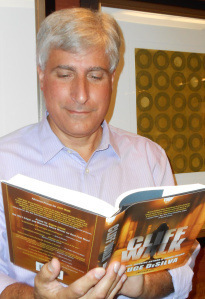 Steve Berry is a New York Times best-selling author whose latest, The Columbus Affair, will be released on New Year’s Day. You can learn more about Steve here.
Steve Berry is a New York Times best-selling author whose latest, The Columbus Affair, will be released on New Year’s Day. You can learn more about Steve here.
Cliff Walk is the second novel in my hardboiled crime series featuring Liam Mulligan, an investigative reporter at a dying newspaper in Providence, Rhode Island. The first, Rogue Island, won both the Edgar Award and the Macavity Award. Reviewers say Cliff Walk is even better. You can purchase the Mulligan novels here.


November 12, 2012
Who’s Reading “Cliff Walk” Now? It’s Crime Novelist Reed Farrel Coleman
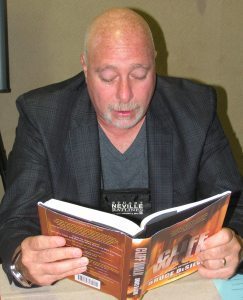
Reed Farrel Coleman
Reed Farrel Coleman is one of the best crime novelists in the business, a three-time winner of the prestigious Shamus Award. His latest book, Gun Church, has just been published.
You can learn more about Reed here.
Cliff Walk is the second hardboiled crime novel in my series featuring Liam Mulligan, an investigative reporter at a dying Providence, Rhode Island, newspaper. The first, Rogue Island, won the Edgar Award and the Macavity Award and was a finalist for the Shamus, Anthony and Barry Awards. Critics say Cliff Walk is even better. You can purchase the Mulligan novels here.


October 25, 2012
Buddy Guy
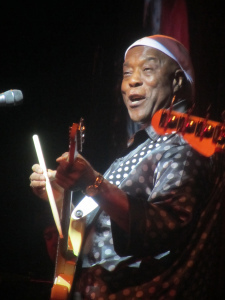
Buddy Guy
My wife Patricia Smith and I saw Buddy Guy perform at B.B. King’s club on 42nd Street in Manhattan last night. At 76, our greatest living bluesman looks 20 years younger and is as dynamic as ever.
Buddy is a favorite of Mulligan, the investigative reporter and blues fan who is the protagonist of my two crime novels, Rogue Island and Cliff Walk.
By the way, Patricia took the picture.
For a treat, check out this video of Buddy playing one of our favorites, “Slippin’ In.”


October 12, 2012
Look Who’s Reading “Cliff Walk” Now! It’s Best-Selling Mystery Writer Chelsea Cain.
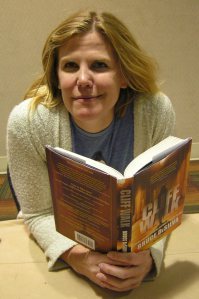
Chelsea Cain
Chelsea Cain is one of the most popular mystery writers around. Her latest novel is called Kill You Twice, and FX is developing another of her books, Heartsick, for TV.
You can learn all about Chelsea and her work by clicking here.
Cliff Walk is the second novel in my hardboiled series featuring Liam Mulligan, an investigative reporter at a dying Providence, Rhode Island, newspaper. The first, Rogue Island, won the Edgar award and the Macavity Award and was a finalist for the Barry, Anthony and Shamus Awards. Reviewers call Cliff Walk even better. You can purchase the Mulligan crime novels by clicking here.


October 11, 2012
Who’s Reading “Cliff Walk”? Award-Winning Noir Novelist Bill Loehfelm!
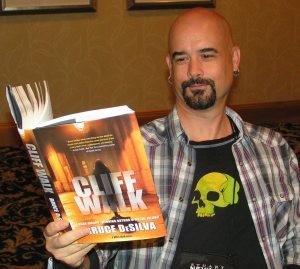
Bill Loehfelm
Bill Loehfelm’s first three novels, Fresh Kills, Bloodroot, and The Devil She Knows, are outstanding. Each is set in his native Staten Island.
When I caught up with Bill last week at Bouchercon, the huge crime-fiction conference, he was excited about his next one, The Devil in Her Way, the first to be set in New Orleans, where he has lived for more than a decade.
But he hasn’t forsaken his hometown entirely. Bill and I both have short stories in Staten Island Noir, an anthology coming from Akashic Press in November.
You can learn more about Bill and his work here.
Cliff Walk is the second crime novel in my series featuring Providence, Rhode Island investigative reporter Liam Mulligan. The first not only won the Edgar Award and the Macavity Award but was a finalist for the Anthony, Barry, and Shamus awards. Reviewers say Cliff Walk is even better. You can purchase the Mulligan novels here.



